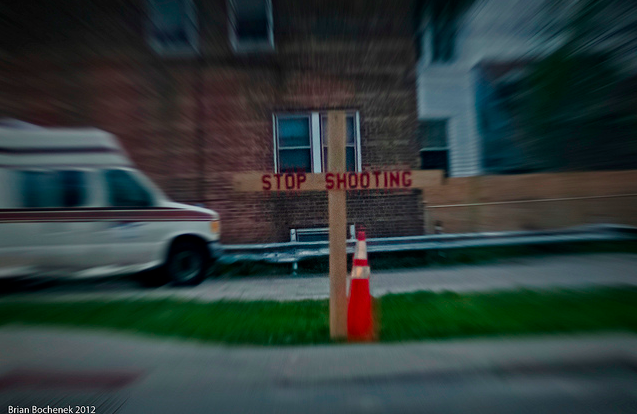The Ebony Magazine Editorial You Need To Read Right Now
By Jon Graef in News on Sep 21, 2013 5:30PM
South Side writer Joshua Adams recently took to the editorial pages of Ebony Magazine to bring some sorely needed context to the national debate about Chicago's horrific shooting violence.
Published on the same day a three-year-old boy was one of nineteen people shot in citywide evening violence, and in a month where Chicago has recorded nearly 30 homicides so far, Adams's words read like a righteous clarion call.
Adams's first paragraphs contextualize race relations in 2013, relations that, in the wake of the George Zimmerman verdict and the ruling against stop-and-frisk, have conversations both productive and profoundly frustrating.
From there, Adams pivots to a frequent talking point made by these conversationalists: namely, why people are supposedly upset with events like the George Zimmerman verdict, but not at Chicago's gun violence.
Of course, anyone who actually lives in the city knows that this false dichotomy is some rank bullshit.
While admitting that Chicago communities have their share of problems--Adams writes that three alum from his Morgan Park High School have been shot and killed, including close friend from his basketball team--Adams also writes that the national media fails to understand the true root causes of the violence in the communities.
As Adams writes: "These people who know so little about Chicago, if they know anything about Black ghetto life at all, will use our struggle to win socio-political debates on race. Black bodies, Black problems deserve more than to be just talking points."
And here, Adams makes the crux of his argument:
Conservatives will bring up violence in Chicago to fuel their narratives about the Black family being in shambles, but cut down any investigation into denied social, economic, or political opportunity for people of color—and are quick to accuse the Black community and our supporters making excuses and playing the victim. Liberals bring it up with the intention to give the Black community their version of ‘the hurtful truth. Yet this supposed counter-narrative (though often better intentioned and slightly more nuanced) gels with the idea that Black people are invested in blaming racism for 100% of their problems instead of solving them and also gives a pass to the impact that racism has had on the conditions in Chicago and beyond.What’s missing in their analysis is any mention of the history of institutionalized attacks on Black people, such as the public housing practices of not allowing Black fathers to move in with their family (prevalent in the 1950s and 60s in cities like Chicago). There’s no call for accountability towards a prison industrial complex sending Black and Brown folks to jail with longer sentences for equal or lesser crimes than any other race. No statistics are presented to show the overreporting of Chicago crime or to combat the many misconceptions about Black on Black crime in general in America. And what’s sadder is if their analysis is that shallow, how could they even begin to discuss, let alone understand, the residuals effects from the sadistic, prolonged assault on our people that was chattel slavery?
Adams goes on to say that no one in Chicago is trying to hide violence, and to say otherwise is utterly false. Adams rightfully calls the violence "senseless, sad, and cowardly." He then mentions Cure Violence, formerly CeaseFire, as a solution that the community has come up with in order to address the violence.
In his closing paragraph, Adams lays out his case in language simple and plain:
But if you aren’t interested in doing anything but pointing in our direction to underscore some sort of racist, classist, blame-skewing point, then keep our city out your mouth. You mention us as long as it will lead to a checkmate in your televised political debates or social media rants. Death is a statistic for you, but for us, it’s a lost loved one. We have some heavy lifting to do, and would rather not carry the extra burden of your apathy and disinterest dressed up as ‘tough love.’
